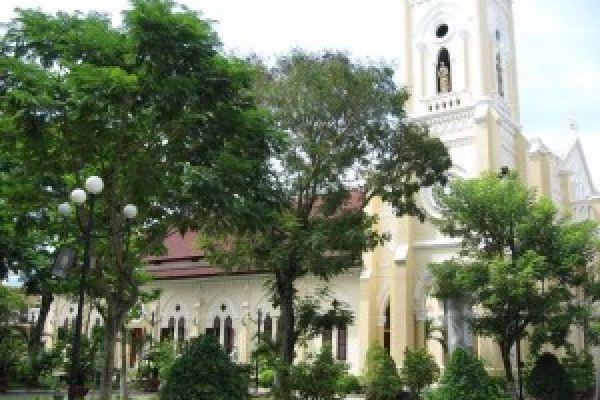Confucianism was introduced into Vietnam early during the Chinese rule and has maintained its influence since that time. In 1072, there was a temple dedicated to Confucius and his leading 72 disciples. Located in Hanoi, this temple was called the Temple of Literature. If one of you has ever been Saigon, you can see at the Botanical Gardens a temple dedicated to Confucius called the Temple of Souvenirs. This is the site of Confucius' birthday celebration which is solemnly honored each year.
What is Confucianism?
As a major emphasis in its ethical system, Confucianism regulates relations between people. If there is improper conduct of these relations, it will cause disorders in the social group and therefore, throw man out of harmony with the universe. The cosmic world (heaven and earth) are in harmony and man's aim is to achieve a similar one. Vietnamese Confucianism, though without a strong formalized organization, still vitally affects nearly all ethnic Vietnamese. This is part of the cultural environment where the child is born.

Khong Tse - the founder of Confucianism
The influence of Confucianism in Vietnam
The profound impact of Confucianism remains strong in Vietnam. Social order is defined by its principle as well as the rituals, deference and obedience.
Confucianism gave Vietnam a highly organized hierarchical society. Yet, while encouraging the improvement of the individual, it did also appeal his positive relationship with the community. In this sense, Confucianism is anti-individualistic.
According to Confucianism, death does not mean the annihilation of man. Confucianists believe that, the spirit which wanders in space as an exile should be brought back to the family altar and be worshiped. Besides, filial reverence is the primary duty of all Confucianists. That the reason why, on all solemn occasions, the ancestral spirit is invoked and offered liquors, flowers and fruit, accompanied with prayers and incense.
Confucianism is vividly seen throughout Vietnam in the Festival of the Arrival of Spring, the Mid-Autumn Festival, the Children's Festival and the Festival of Tet.
Tet is the festival of renewal and rebirth, or meditation and hope. With fireworks, ringing bells, beating tom-toms, toys and food, Tet is a big occasion in Vietnam. Many folk visit the pagodas to worship, burn joss-sticks and sandalwood incense, with flowers, food and liquors placed also on the family altars.

The other worship occasions involve the worship of the land. Such ceremonies include the festival of the beginning of plowing, the rice festival, the harvest festival and the festival of the first fruits. In spite of drought, war, foods… the Vietnamese farmer never seems to lose faith in the land as he plows, plants, harrows, weeds and irrigates it. To express his thankfulness for such response, the land is given honor in seasonal festivals which expressing their hopes and efforts of the past and for the future. Such worship of the land has tended to create in the Vietnamese peasant an almost fanatical attachment to his birthplace which nourished him during his life. It is the combination of worship of the land and ancestor veneration that creates the sight of numberless graves being scattered throughout the farming areas of Vietnam.
Besides, Confucianism has exercised a powerful influence in the formation of Vietnamese society where family is the basic unity. Thus, the three fundamental principles which govern Vietnamese women are the obedience to father until married, the obedience to husband while married, the obedience to eldest son when husband is dead
However, the value of Confucianism as a moderating influence upon social behavior is being rapidly superseded by the flexibility and openness in a developing society.



